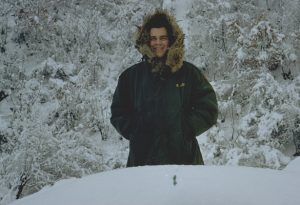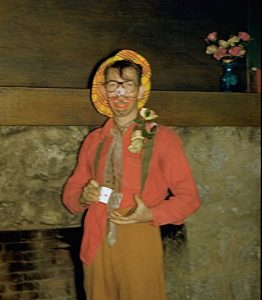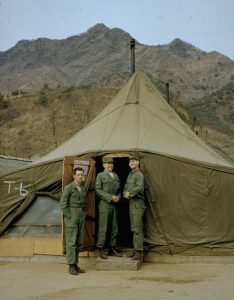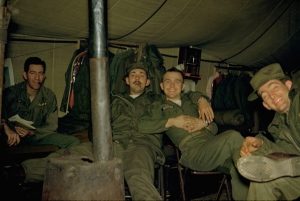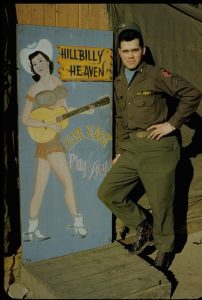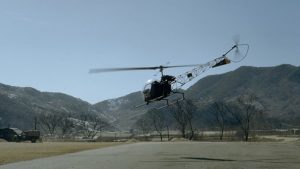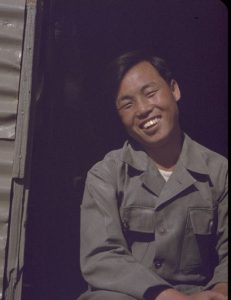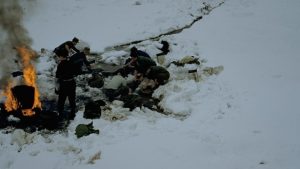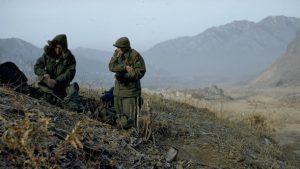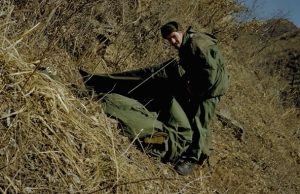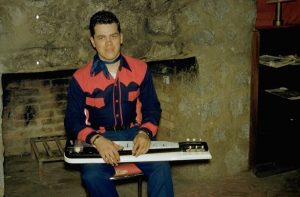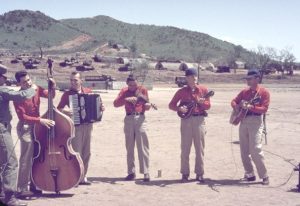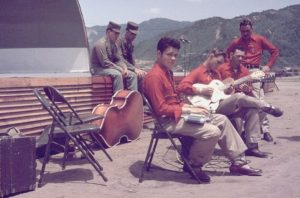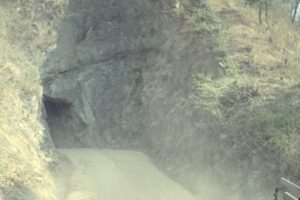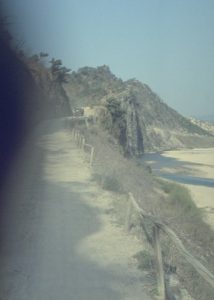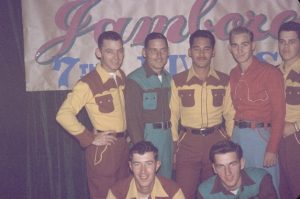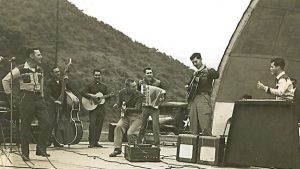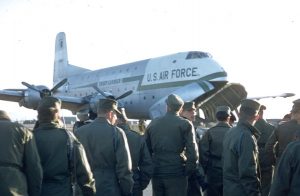Surprisingly the army food at Camp Casey in Korea was much better than at Fort Knox. American army cooks made the meals with Koreans helping and taking care of the KP.
When we were in the field our food was often C-rations. Although packed 10 years earlier for WWII many of these were surprisingly tasty. There were cans of pork-and-beans, spaghetti, hamburger patties, macaroni and cheese, candy bar, chocolate disk to make cocoa drink, along with a can of sterno canned heat that would act as a small stove. Also in each box was a P38 folding can opener, matches, a pack of 6 lucky strike cigarettes, small pack of toilet paper – all the comforts of home!
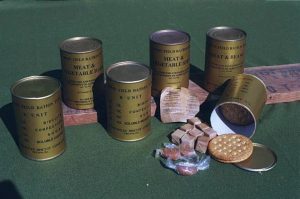
C-rations
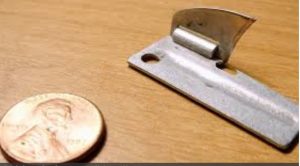
P-38 folding can-opener
The meals served on holidays were especially good. On Thanksgiving we had the whole spread including turkey, mashed potatoes, dressing, cranberry sauce, and pumpkin pie. Each soldier was also given one glass of wine. I figured there were no seconds because the army didn’t want to encourage drinking among the troops. I found out the real truth later that evening.
The cooks at Camp Casey were avid country music fans, and they were also avid booze hounds! After our Thanksgiving meal they invited the band members to their tent for a private holiday party. There in the corner were cases of wine stacked up to the roof. The cooks had “liberated” this from the holiday meal for themselves and their friends! That’s why there were no seconds.
It was a challenge to communicate with the natives since most of them didn’t speak English and we didn’t speak Korean. Many Koreans, however, spoke Japanese since the Japanese had previously occupied Korea. To enable communication a form of pidgin-english evolved that was a mixture of English, Japanese, and Korean.
Here is a very abridged version of the pidgin-english dictionary used by the GIs in Korea:
Moose (from Japanese musume ) – girl or girl friend.
Mamma-san – Older lady or madam in prostitution house.
Cherry girl – Young girl or virgin.
Sucahachie – Literally a Japanese flute ( Use your imagination to figure out what it meant in pidgin).
Number 1 (from ichiban) – very good.
Number 10 -Very bad.
Hoochie – house, tent, residence.
Sayanara – Goodbye, kill, take out garbage, throw away, etc.
Slicky boy – pick pocket.
Short time – “Quickie” with a girl.
Skoshi – small, little.
Takusan – big, large.
Takusan stinko – drunk.
Ediwa – Come here.
Ediwa shoes – White rubber moccasins worn by most Koreans.
Meeda meeda one time – Let me see, look at this.
Cutta-chogie – Get-the-hell-out.
Hava-yes, Hava-eeso – I have some.
Hava-no, Hava-uupso – I don’t have any.
Yak juice – Cheap Korean Liquor (It was like drinking razor blades!)
Our house boy, Kim, liked me and wanted to tell me that I was number 1” (good). The Koreans had trouble saying an “R” or an “F” ,so they had real trouble pronouncing a name like “Roliff”. They would substitute “N” for “R” and ”P” for “F”, so my name would come out “Nolipp”. In order to express his approval of me Kim would say,
“Nolipp, you number PUCKING ONE!”.
One day a dog wandered into our tent. Kim chased him out with a broom yelling ,
“CUTTA EESEEKIAH” .
I asked him what that meant. He said,
“It mean GET-OUT-OF-HERE-SON-OF-A BITCHEE”.
For Christmas someone sent me a baby stocking to hang as a holiday decoration. The houseboy saw this one stocking hanging and he asked me,
Other one hava-no?
He couldn’t understand why I had only one stocking.
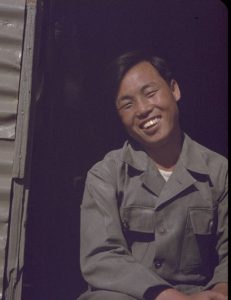
Kim, our houseboy
Cigarettes and soap were a rarity to the natives and were therefore quite valuable as a form of barter. The houseboys often gave us money to buy these items for them from the PX which they could then trade in the Korean market.
When we went to Japan the houseboys would ask us to bring back Ajinomoto. It came in a red tin box. I didn’t know until years later that it was mono-sodium glutamate (MSG) and was valued by Koreans as a food preservative and flavor enhancer.
Other items of value were GI wool blankets. Almost all mamma-sans wore pants made from these.
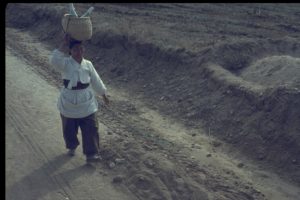
Mama-san wearing GI blanket pants and “ediwa shoes”
Often in the Korean markets we would see bottles of expensive whiskey such as Seagram’s VO. Even though these had all the proper tax stamps, labels, and perfectly intact seals, it was not a wise purchase. They always contained “yak juice”. I never figured out how they refilled those bottles without breaking the seals.
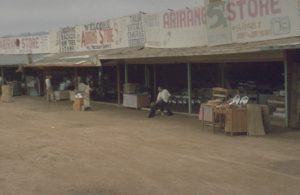
Korean Market
Officially we were not permitted to go to the villages or mingle with the natives, but the rule was not strongly enforced. I know of several beds in our tent that had hardly ever been slept in because the occupant had a “moose” in the village.
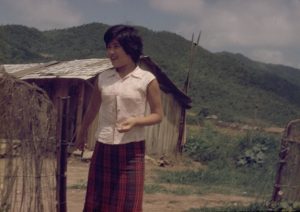
“Doris Day”
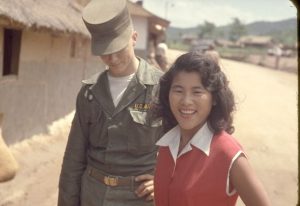
“Jane Fonda”
We were not allowed to have U.S. dollars in Korea. The only U.S. coins we had were pennies. Instead we were issued Military Payment Certificates (MPC). Every few months the Army would give us notice that as of tomorrow all MPC previously issued would have no value and to exchange old MPC for new immediately. It had something to do with the Korean black market. I only know that it did a real number on Koreans that did business with GIs, because when this happened we would see mamma-sans crying at our gate with large rolls of valueless obsolete bills begging some GI to exchange it.
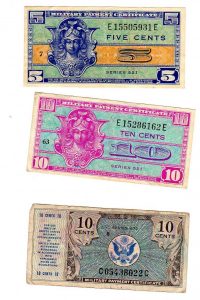
MPC – nickels and dimes – The largest bill I saw was $100. Unfortunately it wasn’t mine
The Far East Playboys never had more than 8 members, so we shared our tent with another group, The Jazz Combo. Many of these guys were extremely talented, had played and sang for big name bands in the States, and had much knowledge of music theory which they willingly shared. I enjoyed hearing their stories and picking their brains.
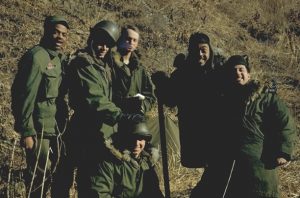
Our tent mates from The Jazz Band
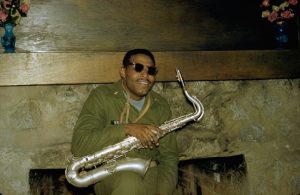
Benny Grant from The Jazz Band
Our band also had stars from the past. One in particular I know of was Faron Young, who had several country hits in the early 50’s and also starred in some western movies.
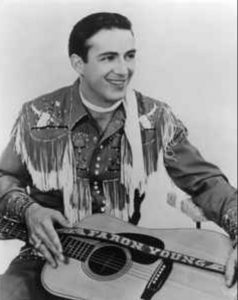
Faron Young was once a member of The Far East Playboys
This was 1955 and we were pretty much cut off from what was going on in the States when it came to the latest fads and styles. We had never heard of Elvis, so when guys would come in fresh from the States and try out for the band shivering and swiveling a-la Elvis, we thought they were having some kind of a spasm. It took us awhile to get used to this kind of music.
During this time a country singer named Webb Pierce became popular. His steel player, Bud Issacs, had a very unique sound. No matter what I tried I could not re-produce it. I tried using bar-slants, tuned the guitar backwards, and everything I could think of but I just couldn’t get the same effect.
One day a show that included an Air Force country band from the Philippines performed for our outfit. The steel player was producing the sound that had me mystified. After the show I went up and inspected his guitar. I immediately saw what was going on. He was using a pedal to change the tuning on the fly by stretching the strings! This was the first “pedal steel” I had ever seen. Later with the help of my buddy Jim and some scrap metal and commo wire, we installed two pedals on my guitar. Now I could sound like the modern country players.
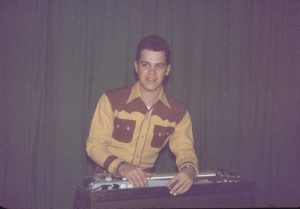
Teisco 8-string lap steel which I purchased in Tokyo for $26. I put it on a stand, modified the pickups, and added 2 pedals.
I left Korea for the States on New-Years day, 1957. My buddy Glenn, a guitar player and vocalist with our band, came with me. We walked up the gang plank carrying our duffel bags along with our guitars. Soon after boarding the ship I heard this on the ship’s speakers:
“WOULD THOSE TWO SOLDIERS WHO BOARDED THE SHIP CARRYING GUITARS REPORT TO THE ORDERLY ROOM IMMEDIATELY”.
Now what, I thought, assuming we were in for some kind of punishment. Instead, they wanted us to entertain the officers wives who were being sent home from Japan! The way Glenn and I lived on the trip home was completely different from the way we did on the way over. We were treated as celebrities, and spent our days in the officers quarters eating real food from real plates and white table cloths surrounded by beautiful women. We played music for the ladies on afternoons and evenings. One evening we played a two-man show for the whole ship with a Navy crew member as the MC. The next day they re-played the recorded show on the ship’s PA. The only time we were in the hold with the troops was to sleep in our hammocks.
As of 2017 Camp Casey is still active and occupied by U.S. soldiers. The troops no longer live in tents, but in modern buildings with TVs and high speed internet in each soldier’s room.
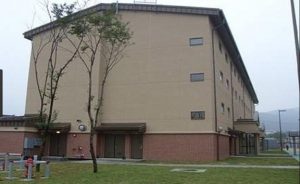
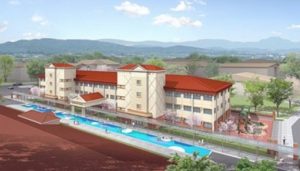
Camp Casey 2017
The city of Seoul has changed also, as shown by the following pictures:
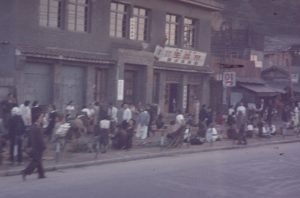
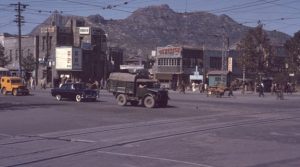
Downtown Seoul c.1955

Downtown Seoul c.2017
Thirty years after I served in Camp Casey, my son Neil was also stationed there. It is possible that I could have a grandchild stationed there also. It is interesting to note that after more than 3 generations, troops of the American Army still occupy South Korea.
More Pictures HERE

